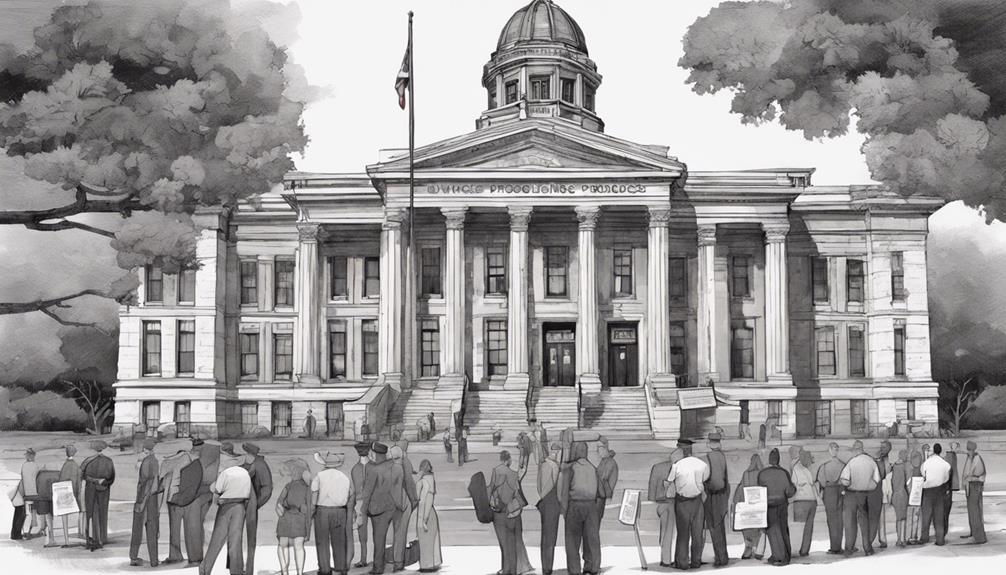When thinking about ending a marriage, one may wonder how long it takes to finalize divorce proceedings in Texas. The timeline for a divorce in the Lone Star State can vary significantly depending on various factors.
Whether the process is smooth-sailing or encounters obstacles, understanding the nuances of the legal system and potential strategies for expediting the divorce can be valuable.
So, how long does it actually take to untie the knot in Texas? Stay tuned to uncover the intricacies that influence this timeline.
Key Takeaways
- Uncontested divorces in Texas typically take 3-4 months for finalization.
- Mandatory 60-day waiting period must be completed before divorce decree can be issued.
- Child custody arrangements can impact the overall timeline of the divorce process.
- Couples with significant assets or complex disputes may lengthen the divorce duration.
Texas Divorce Process Overview
Navigating the divorce process in Texas can be a complex journey, requiring a clear understanding of the legal procedures and timelines involved. In Texas, an uncontested divorce, where both parties agree on all terms, can be finalized in as little as 60 days, but the court can't issue a divorce decree before the mandatory waiting period has elapsed. Typically, even uncontested divorces take around 3 to 4 months to complete.
Child custody arrangements, disputes over marital assets, and the length of the marriage can all impact the divorce timeline. In cases where child custody disputes or significant assets are involved, mediation may be required, especially in counties like Travis County, to help couples find common ground.
Seeking the advice and guidance of experienced family law attorneys can be crucial in ensuring a smooth and fair resolution for all parties involved.
Factors Influencing Divorce Duration

Factors influencing the duration of a divorce in Texas can vary significantly depending on the complexities of the case, such as couples owning a business or significant assets, the involvement of minor children, long-term marriages, one-income households, fault-based divorces, and the potential need for mediation to facilitate compromises. When navigating through these intricate situations, consulting a knowledgeable divorce lawyer or family law attorney is essential. These professionals can offer guidance on crucial matters like child custody, property division, and other contested issues, potentially expediting the divorce process. In cases involving significant assets or marital property disputes, the timeline for finalizing a divorce may lengthen due to the complexities of asset division. Additionally, fault-based divorces or long-term marriages often require meticulous legal attention to ensure fair outcomes for both parties. Mediation can play a crucial role in resolving disputes amicably, leading to quicker resolutions and smoother transitions for families.
| Factors Influencing Divorce Duration | Examples | Impact on Divorce Process |
|---|---|---|
| Couples owning significant assets | Business ownership, substantial investments | Lengthens divorce process |
| Involvement of minor children | Child custody arrangements, parenting plans | Affects child custody |
| Fault-based divorces | Infidelity, domestic abuse allegations | Requires legal scrutiny |
Types of Divorce in Texas
When considering divorce in Texas, understanding the various types recognized by the state is crucial for navigating the legal process effectively.
In Texas, divorces can be categorized into contested and uncontested divorces. Uncontested divorces generally follow a shorter timeline for resolution compared to contested divorces.
Contested divorces involve disagreements between the parties on various issues such as division of assets, child custody, or alimony, which can significantly prolong the divorce process.
The resolution method, whether contested or uncontested, plays a crucial role in determining how long it takes to finalize a divorce in Texas.
Recognizing the differences between contested and uncontested divorces is essential for planning the divorce process efficiently under Texas law. By understanding these distinctions, individuals embarking on a Texas divorce can better prepare themselves for the journey ahead and make informed decisions throughout the legal proceedings.
Expedited Divorce Options

For couples in Texas seeking a quicker resolution to their divorce, exploring expedited divorce options can significantly reduce the waiting time for finalizing the process. Expedited divorce options in Texas, such as uncontested divorces, offer a streamlined way to dissolve a marriage. While the court can't finalize a divorce before the mandatory 60-day waiting period, uncontested divorces can still be resolved relatively quickly. Typically taking 3 to 4 months to finalize, uncontested divorces become a quicker option for couples who've mutual agreements on all aspects of their divorce.
These mutual agreements are crucial for qualifying for an expedited uncontested divorce. Choosing expedited divorce options is ideal for couples looking for a faster and more efficient dissolution of their marriage in Texas. By opting for this route, couples can navigate the divorce process with more ease and speed, ultimately moving forward with their lives in a timely manner.
Finalizing a Divorce in Texas
Upon the completion of the mandatory 60-day waiting period post-filing for divorce in Texas, the finalization process can proceed, culminating in the signing of the divorce decree by the judge to legally separate the parties.
In Texas, the waiting period is a crucial part of the divorce process, ensuring that both parties have adequate time to consider their decision. It's important to note that the court can't finalize the divorce before this waiting period is over. For uncontested divorces where both parties agree on all terms, the process can move swiftly, with finalization typically taking place within 60-90 days after the waiting period.
During finalization, the judge reviews the divorce decree, which outlines the terms of the divorce, and signs it to make the separation official. This step marks the legal end of the marriage and sets the stage for both parties to move forward with their lives separately.
Frequently Asked Questions
How Long Does It Take to Get a Divorce in Texas if Both Parties Agree?
If both parties agree in Texas, a divorce typically takes around 3 to 4 months to finalize. It's crucial for mutual agreement on all key matters. Even in uncontested cases, the court must respect the 60-day waiting period.
How Fast Can I Get a Divorce in Texas?
Getting a divorce in Texas can be relatively quick if both parties agree and meet the requirements. Factors like mutual agreement, absence of minor children, and property division can expedite the process, usually taking 3 to 4 months.
How Long Do You Have to Be Separated Before Divorce Is Automatic in Texas?
We understand the concern about mandatory separation before divorce, but in Texas, we know that no specific period of separation is required for divorce. Once residency and filing conditions are met, couples can proceed with divorce.
How Long Does a Uncontested Divorce Take in Texas?
In Texas, an uncontested divorce typically takes a minimum of 60 days to finalize. The court cannot complete the process before this waiting period. It usually lasts around 3 to 4 months, even with full agreement between spouses.
Conclusion
As we navigate the winding roads of divorce in Texas, remember that time is a river, flowing steadily towards resolution.
Just like a compass guiding us through rough terrain, legal guidance can lead us to smoother waters.
Let's embrace the journey, facing each challenge with strength and grace.
Like a phoenix rising from the ashes, we emerge from this process stronger and ready to begin anew.
Trust in the process, for the end is just the beginning.










